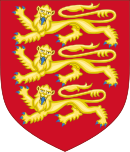| This article is part of a series within the Politics of the United Kingdom on the |
 |
|---|
There are five types of elections in England: elections to the House of Commons of the United Kingdom, elections to the devolved London Assembly, local council elections, metro mayor elections, and the Police and crime commissioner elections, in addition to by-elections for each aforementioned election. Elections are held on Election Day, which is conventionally a Thursday.
Under the Fixed-term Parliaments Act 2011, all five types of elections are held after fixed periods, though early elections to the UK parliament occurred in both 2017 and 2019.[1][2] After winning the 2019 election, the Conservative Party committed to repealing the FTPA.[3] On 1 December 2020, in fulfilment of this manifesto pledge, the government published a draft Fixed-term Parliaments Act 2011 (Repeal) Bill, which would repeal the FTPA and revive the royal prerogative power of dissolving Parliament as it existed before the Act.[4] The legislation was formally announced as the Dissolution and Calling of Parliament Bill in the Queen's Speech of 11 May 2021, and granted Royal Assent on 24 March 2022.[5]
The three electoral systems used for elections in England are: first-past-the-post (for UK elections and local elections, though individual local authorities are able to move to STV under recent legislation), the additional member system (for Mayor and London Assembly elections) and the supplementary vote (for Police and Crime Commissioner elections; although proposals by the UK Government to change Assembly, Mayor and PCC elections to FPTP have been made).[6]
- ^ Worthy, Ben (19 April 2017). "Theresa May's snap election: historic or Pyrrhic?". London School of Economics. Retrieved 20 May 2022.
- ^ Butterworth, Benjamin (29 October 2019). "General election 2019: UK snap election to be held on 12 December after Boris Johnson wins Commons vote 438-20". i. Retrieved 20 May 2022.
- ^ "Get Brexit Done: the Conservative and Unionist Party Manifesto 2019" (PDF). Conservative and Unionist Party. p. 48. Retrieved 20 May 2022.
- ^ "Government to fulfil manifesto commitment and scrap Fixed-term Parliaments Act". gov.uk. 1 December 2020. Retrieved 20 May 2022.
- ^ Blewett, Sam (11 May 2021). "A brief look at the Bills included in the Queen's Speech". Evening Standard. Retrieved 20 May 2022.
- ^ Woodcock, Andrew (16 March 2021). "Priti Patel under fire over plan to change voting system for London mayor". The Independent. Retrieved 30 September 2021.
